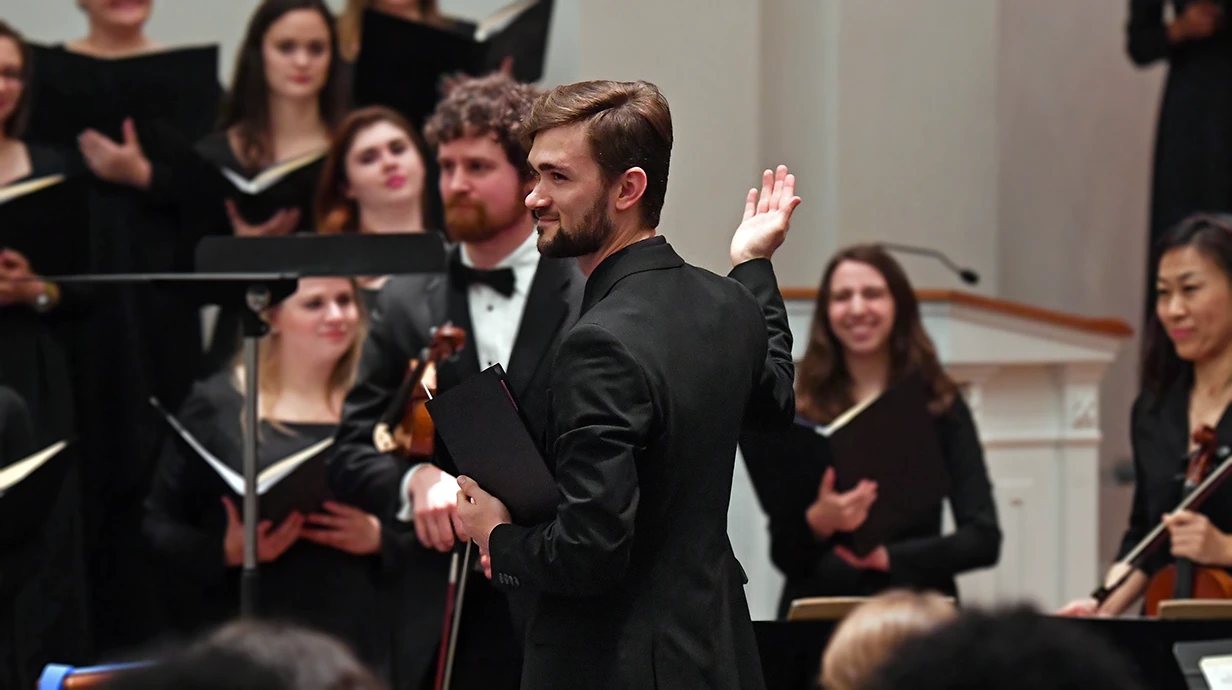Music Graduate Students
Graduate students in the Department of Music are mentored by expert faculty and excel in teaching, research, and performance.

Masterful Music Experiences
Graduate students in the Department of Music gain teaching experience in the classroom. Guided by distinguished faculty, graduate students conduct research important to their areas of study and interest. Students are encouraged to reach the next level of musicianship with focus on solo performance, chamber group collaboration, and leadership roles in ensembles.
UM Music offers substantial scholarships for music majors through the Music Major Advantage (MMA) initiative, which aggregates scholarships and financial awards from across campus and the Department of Music. To be considered, applicants must apply to the University of Mississippi, complete the Music Scholarship Application, and audition.
Learn how much you can expect to pay for a graduate education at Ole Miss — and find ways to bring that cost down with scholarships, aid, assistantships with other departments, and more.
Master of Music
Assistantships for full-time masters students start at $6,750, waive out-of-state portion of tuition (a value of $18,828), and waive 75% of the in-state portion tuition (a value of $7,209). Additional scholarships could further boost the value of the total package.
Ph.D.
Assistantships for full-time PhD students start at $13,500, and waive 100% of both the in-state portion of tuition (a value of $9,612) and the out-of-state portion of tuition (a value of $18,828). Additional scholarships and fellowships could boost the value of the total package even further.
Application Process
Assistantship assignments are based on your interests and strengths and the needs of the department. Formal acceptance to the Graduate School and a graduate program within the Department of Music is required to be considered for an assistantship.
To apply for an assistantship:
- Download and complete the Graduate Assistantship Application.
- Email the completed application to Rhonda Hackworth.
- Letters of recommendation should be sent directly to Rhonda Hackworth from the recommenders.
Applications submitted by March 1st will receive priority consideration. After March 1st, assistantships will be awarded only if positions are still available.
Welcome from the Coordinator of Graduate Programs
As you embark on an exciting journey of advanced study, research, and musical exploration, we are thrilled to have you as part of our vibrant and dynamic community. Our department is dedicated to fostering an environment that encourages creativity, academic excellence, and professional growth. We are excited to see the contributions you will make in your graduate study and look forward to supporting you in achieving your goals.
Rhonda Hackworth
Associate Professor of Music Education
Graduate Diagnostic Exams
The Graduate Diagnostic Theory exam tests all incoming graduate music majors. The exam covers all aspects of a two-year undergraduate music theory curriculum, including form and is divided into two parts, written and sight-singing. Students must pass both the written and sight singing parts to pass the exam.
The Graduate Music History Diagnostic Examination is administered to all incoming graduate students in the Department of Music. The exam consists of four parts: terms, listening, score identification, and short essays.
Exam Dates: Fall 2025
| Sight Singing Exam | Wednesday, August 20, 2025 | 9:00am - Noon | Room 157 |
| Theory Exam | Wednesday, August 20, 2025 | 2:00-3:00pm | Room 157 |
| Musicology Exam | Thursday, August 21, 2025 | 2:30-4:30pm | Room 157 |
